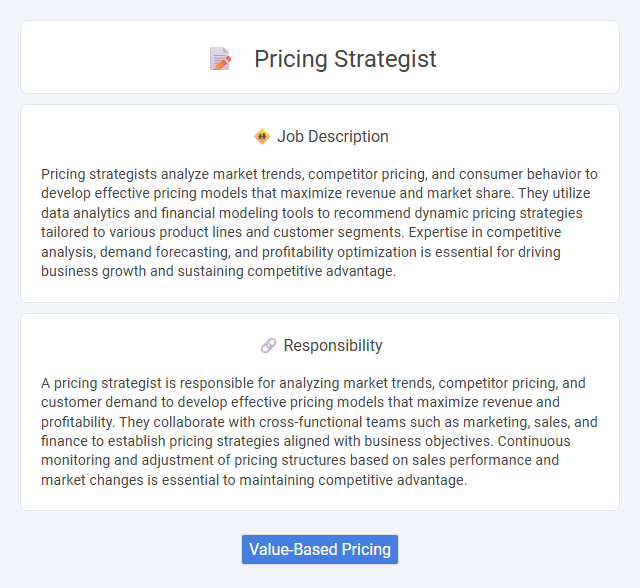
Pricing strategists analyze market trends, competitor pricing, and consumer behavior to develop effective pricing models that maximize revenue and market share. They utilize data analytics and financial modeling tools to recommend dynamic pricing strategies tailored to various product lines and customer segments. Expertise in competitive analysis, demand forecasting, and profitability optimization is essential for driving business growth and sustaining competitive advantage.
Individuals with strong analytical skills and an interest in market dynamics are likely suited for a pricing strategist role. Those who enjoy working with data, forecasting trends, and making strategic decisions may find this career fulfilling. People who prefer routine tasks and minimal decision-making might find this position challenging.
Qualification
A pricing strategist typically requires a strong background in finance, economics, or business administration, often holding a bachelor's or master's degree in these fields. Proficiency in data analysis tools such as Excel, SQL, and pricing software, combined with a deep understanding of market trends and competitive analysis, is essential. Experience in developing pricing models, conducting market research, and applying strategic thinking to maximize profitability distinguishes top candidates in this role.
Responsibility
A pricing strategist is responsible for analyzing market trends, competitor pricing, and customer demand to develop effective pricing models that maximize revenue and profitability. They collaborate with cross-functional teams such as marketing, sales, and finance to establish pricing strategies aligned with business objectives. Continuous monitoring and adjustment of pricing structures based on sales performance and market changes is essential to maintaining competitive advantage.
Benefit
A pricing strategist likely enhances company profitability by analyzing market trends and competitor pricing to set optimal price points. This role probably improves revenue forecasting accuracy, enabling better financial planning and resource allocation. Employing data-driven strategies, a pricing strategist can potentially increase market share while maintaining customer satisfaction through balanced pricing models.
Challenge
A Pricing Strategist likely faces the challenge of balancing market demand with competitive pricing to maximize revenue without alienating customers. They probably need to analyze vast amounts of data to predict price sensitivity and adjust strategies dynamically. Overcoming uncertainties in market trends and consumer behavior remains a significant hurdle in ensuring pricing effectiveness.
Career Advancement
Pricing strategists analyze market trends and competitor pricing to develop dynamic pricing models that optimize revenue and profitability. Mastery of data analytics, consumer behavior, and financial modeling accelerates career growth from entry-level analyst roles to senior strategist and pricing management positions. Expertise in pricing strategy directly influences business outcomes, making it a critical skill for advancement into executive roles such as Chief Pricing Officer or Director of Revenue Management.
Key Terms
Value-Based Pricing
A Pricing Strategist specializing in Value-Based Pricing analyzes customer perceptions and market demand to set prices that reflect the product's intrinsic value rather than solely costs. They leverage data-driven insights and competitive intelligence to optimize profitability while enhancing customer satisfaction. This role requires expertise in market segmentation, willingness-to-pay assessments, and strategic price modeling to maximize revenue growth.
 kuljobs.com
kuljobs.com